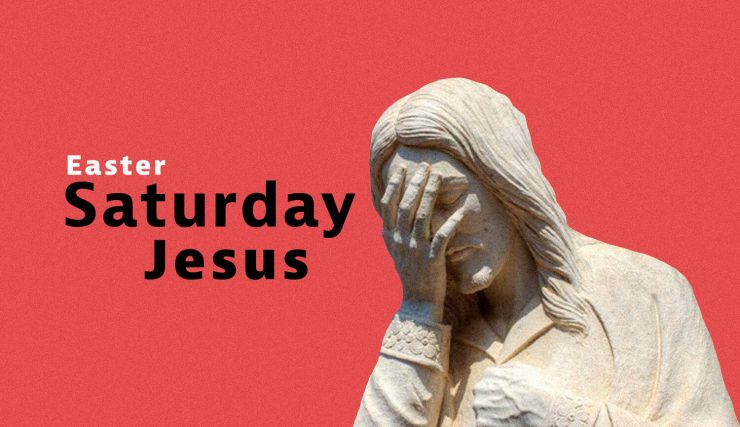This article is reported from blackbothy.com
Several years ago, I was a minister in an inner-city community church. On the Easter weekend I am writing about, a member of our community, Davey, * had taken his own life.
In preparation for the celebration of Easter Sunday, we as a community had anticipated that there would be a joyful gathering and this was for us, an offering to one another. On that Easter Sunday, the death of our friend and his absence from our gathering was so substantial it felt as if something vital had broken. This break was experienced as more powerful than the existence of any hope that Easter Sunday might represent, and many of us felt adrift in our grief and disappointment. Present however was an authentic honestly about what was actually being experienced. No platitudes about ‘everything happening for a reason’ were offered, no one whispered that Davey was ‘in a better place’. We wept and were overwhelmed with sadness-together.
The Christian narrative about Easter marks the capture, trail, execution and burial of Jesus and the resurrection of Christ. For many Christian people the main focus of the weekend is the cross of ‘Good Friday’ and the (resurrected) hope that ‘Sunday’ personifies, but what of the day of burial, the day when for Jesus’ friends, all was lost? What of ‘Saturday’?
Holy Saturday can be thought of as a pause, a day in between – empty and silent – in which all of our pain can reside without meaningful comprehension or hope of reprieve, a day that honors the experience of grief and disappointment. As the story goes, on this day Jesus was buried and then … grief and disappointment descend. There was, for his friends and family, no sense that this bleak despair would be met by anything other than life without him. The ‘Sunday’ reprieve was not assumed nor expected, and as a group we can imagine they experienced devastated expectations, shame, heartbreak and disappointment. The person in whom they had put their trust and in whom they had placed their hopes about the future had been destroyed, and they were left broken.
My own experience of the death of Davey was a deep disappointment that when I looked up from my grief, life before me lacked meaning., and as a leader in this community I felt bereft of purpose. The weight of grief shrouded me, and I felt as if ‘Saturday’ had in some way permeated into the day where hope was expected and so Sunday felt corrupted. Gradually though, I began to understand that something significant was present within that experience, something that I had previously missed.
Not one of us knows what our world will look like when this time of corona has resolved, but we can say that we are being altered by these events and many of us may well be feeling as if purpose and meaning are gone, and that living without human touch is a new reality for many. Holy Saturday is a day in the liturgical calendar that is specifically set aside for grief and disappointment and in this the experience of life feeling as if it is hopeless. What a profound memorial and yet, rarely is it mentioned with any real gravitas. It is almost as if it is treated as a day in which to prepare for the party on Sunday.
To say that life feels as if there is no hope, is not the same as declaring that there is no hope. Disappointment and grief are emotional engagements with painful reality rather than a nihilistic conclusion that hope does not exist. It is this encounter with uncertainty that is so profoundly relevant to us all now
This grief and disappointment of ‘Saturday’: the experience of life feeling profoundly uncertain – is fundamental to the entire Easter story of transformation and freedom, and it is this ‘in between’ day that solace can be found, even though meaning and sense-making are overshadowed by our fear, anxiety, grief and for some, sickness. What would it be if we could allow ourselves to be upended and transformed by a narrative of grief and disappointment and in this to reside in the Saturday ‘pause’ without rushing into any attempt to make sense of the pain, or find a way to justify it?
The antidote to disappointment and grief is loving relationship, and while we can say that connectedness is a given, the nature of our connections with other people can be talked about. Herein lies A paradox: we can think about a ‘Saturday’ existence when we are not living it, but when we are immersed within our own fear and uncertainty we are often unable to recognise that this is a communal encounter that can be shared: we can accompany one another. If we rush to attempt to make meaning of a person’s grief and disappointment, we run the risk of diminishing what is present and further isolating one another and so the point here is that we need to pause-together. When Saturday experiences permeate our Sunday expectations, we have an opportunity to choose compassion and accompany one another.
Compassion is by definition relational, and so if we can pause and consider the reality of life as it is for another person, it is possible to recognise that despite how overwhelmed we might be feeling, grief can be shared and disappointments recognised and in this, solace experienced in the presence of one another.
This Easter weekend, so many of us will be experiencing a loss of meaning and purpose in our lives, this is our Saturday. We can take what we are feeling seriously and, grounded in compassion, lean towards one another. Pick up the phone, call out to a neighbour, send a letter, stay with the grief, honor the disappointment, listen to the uncertainty and find solace in relationships. This time will pass, and while the whole point here is to stay present, the manner in which we engage together in this crisis will have a profound impact on how we continue to live together. We can decide to be motivated by compassion and in this, be a country that seeks solace in how we honor one another.
Dr Cath McKinney is an alumna of the University of Divinity and Convenor-elect of the Australian Collaborators in Feminist Theologies.






Beautiful Cath
Bless you Cath